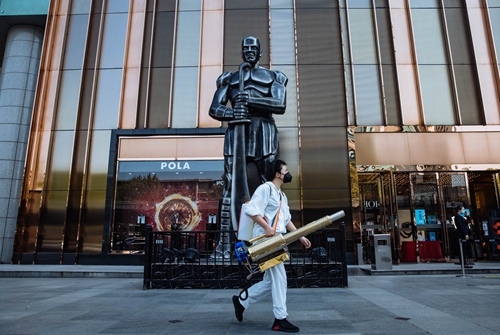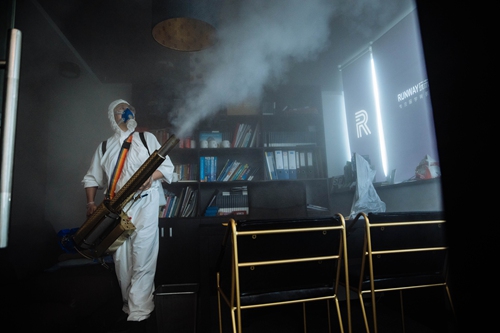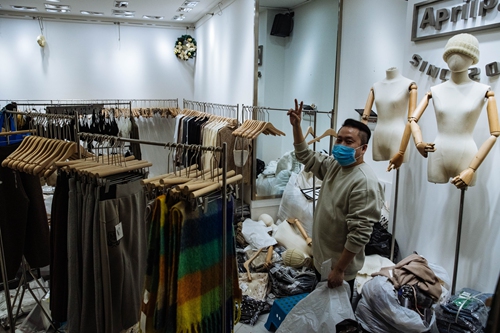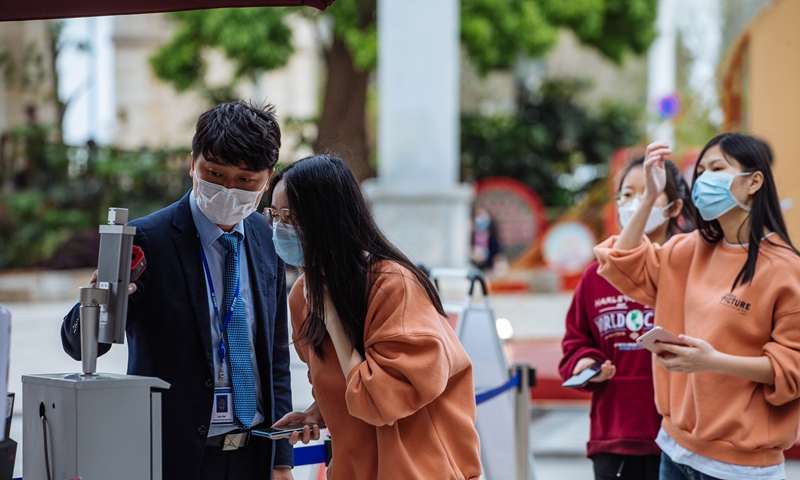HOME >> CHINA,SPECIAL-COVERAGE
Second wave of virus in Wuhan ‘unlikely’
By Zhao Yusha in Wuhan Source:Global Times Published: 2020/4/9 22:03:40 Last Updated: 2020/4/10 0:23:40

Thursday is the second day since Wuhan lifted its 76-day lockdown. Office buildings and markets are preparing to reopen while public transport has become busier. Everything in Wuhan is reviving. Photo: Li Hao/GT
Residents in Wuhan, who are about to embrace a normal life after enduring two months indoors, familiarizing themselves with every possible good hygiene habit, turning themselves into amateur coronavirus experts, as well as Wuhan authorities, who drew lessons from previous missteps, orchestrated detailed viral prevention plans to cover every possible loophole for large-scale infections, using their action to whisk off the possibility of a second wave, firmly believe that Wuhan, after all it had suffered and learned, could be potentially the safest place in China now.
"Don't get too close to me, and put on your face mask, young lady! You are not getting any fish if you don't respect virus prevention rules," yelled fish vendor Zhang from Baishazhou market, Wuhan's biggest agricultural products market, while selling fish to a customer.
Although entering the market requires temperature tests and inspection of "green codes," which suggest the user is symptom-free and has had no contact with suspected or confirmed coronavirus patients, Zhang's worry for the contagion is not soothed.
"Don't you know there are asymptomatic patients? Do you think those measures can help detect them? The virus is so canny, we have to always be on high alert."
China's State Council on Wednesday published new regulations on the management of silent coronavirus carriers, specifying that the group are infectious and have risks of transmission.
The regulations standardize the process of reporting silent carriers, requiring nationwide medical institutes to report them within two hours via the internet after discovering any such case.
A total of 24 asymptomatic patients have been reported on Wednesday in Hubei Province, which administrates Wuhan.
Worries over whether the silent carriers would cause a second outbreak amid the frequent flow of people after the lockdown ended has also bred ground for rumors. On Wednesday, under the topic of "Wuhan lifts lockdown" on Sina Weibo, a netizen posted a video showing someone falling to the ground in Jiang'an district in Wuhan and claimed that Wuhan is still very much dangerous due to large numbers of silent carriers lurking in the city. The subsequent post caused widespread panic on social media platforms and intensified people's concerns.
However, on late Wednesday, local police debunked the post, saying it was a rumor. The local police investigation showed that the man fell to the ground due to alcohol intoxication and was sent to a nearby hospital immediately to sober up.
Mass detection
Wuhan local Zhang Kaiyue told the Global Times that more than 1,000 workers in her company, which has 1,500 employees in total were arranged to do nucleic acid tests on Thursday, the first day of work resumption.
"It mainly targets asymptomatic patients. We need to do nucleic acid tests twice, or combine such tests with CT scans because our boss believes one nucleic acid test alone is not accurate," said Zhang, noting that it is simple and quick to get tested in the hospital, "half an hour for queuing and testing on average, and you get the result the next day."
As Wuhan eased lockdowns and many in the city returned to offices on Wednesday, long lines in front of hospitals were seen across the city. Many of those who came back to work wanted to test for coronavirus in fear of spreading it among their colleagues and those who they rub shoulders with.
Wang Hui, deputy head of Wuhan's Wuchang district health commission told the Global Times that many of the district's silent carriers were detected among close contacts of confirmed patients, and the number is relatively small.
Wang said the health commission has instructed the district's employers to thoroughly inspect employees who return to work.

Thursday is the second day since Wuhan lifted its 76-day lockdown. Office buildings and markets are preparing to reopen while public transport has become busier. Everything in Wuhan is reviving. Photo: Li Hao/GT
"Now Wuhan residents are very cautious regarding the viral contagion. They won't stay home hopeful for recovery after they find abnormalities in their health conditions, like they did in January. Most patients with fever will apply for tests in hospitals; now, even seemingly healthy people want to test themselves, which helps us find asymptomatic patients," said Wang.Ever since Wuhan began recording asymptomatic patients, more communities have begun to tighten virus prevention policies, and even re-impose previous lockdown policies.
Wang Qianlin who lives in a community in Wuhan's Qiaokou district comes downstairs only to get deliveries sent to him between the community's rust steel gate.
"For a short time in early March we were allowed to go out, but all of sudden it closed again after an asymptomatic patient was reported here," said Wang, noting that now he was told only one family member is allowed to go downstairs once a day.
Wu Zunyou, a researcher with the Chinese Center for Disease Control and Prevention said during an interview that people in Wuhan's communities are relatively safe compared with people outside of China. The chance of asymptomatic patients leaving Wuhan is slim, because they have already isolated themselves for 14-days multiple times, said Wu.
Asymptomatic patients were infected at the same time as patients with obvious symptoms, said Zhang Wenhong, head of Shanghai's COVID-19 clinical expert team. So if China doesn't see drastic increases of confirmed cases within two to four weeks, the risk of asymptomatic patients can be whisked off.
Zhang said that Wuhan is perhaps the "safest city in China now," as many people in the city may already have developed immune defenses against the virus. But he stressed it is only an assumption.
Walking on thin ice
Wuhan locals often joke, you can forget putting on clothes, but you can't forget your phone with your "green code" in it.
"Green codes" have dominated Wuhan residents' lives throughout the pandemic. Every public place, residential community, shopping mall and office building has its own code for entrants and leavers to scan; one will only be allowed to enter or exit the building after showing a green code, and having their temperature scanned.
Wuhan's Tianhe International Airport and train stations also require arrivals to the city to apply for green codes and report their travel histories abroad if they have any.
Users of the code also need to choose "enter" or "exit" as so to help big data analyze the time of one's stay in one place and conclude whether they rub shoulders with suspected patients.

Thursday is the second day since Wuhan lifted its 76-day lockdown. Office buildings and markets are preparing to reopen while public transport has become busier. Everything in Wuhan is reviving. Photo: Li Hao/GT
Ever since taxis resumed services from Wednesday, passengers have to scan and show drivers a green code before getting in.In Wuhan, although restaurants are open, dining-in is strictly prohibited in fear of infection. Many restaurants have even used short cabinets to block entrances into cooking areas in case customers happen to walk in.
Vendors are gradually returning to one of Wuhan's biggest wholesale clothing markets in Qiaokou district. The market has about 6,000 vendors, and less than one third have returned to work since Wednesday.
Apart from showing green codes and having temperatures scanned at the entrance, managers of the market will test vendors' temperatures one by one twice a day.
Zhang Lili from the market has five bottles of disinfectant at the counter next to the entrance door of her shop. "Every customer will be soaked with alcoholic disinfectant before entering."
Zhang from Baishazhou market said all sellers here will undergo disinfection five times daily "We are instructed by the market to keep a one-meter distance and use public chopsticks while eating with others."
In Wuhan's busiest business district, Wuhan International Plaza Shopping Center, 29-year-old Zhang, wearing medical gloves, was carefully squeezing disinfectant out of a small bottle on a public bench wiping a "clean" spot for herself before sitting down.
"Yes, Wuhan's coronavirus cases have dropped drastically; and yes the city lifted the lockdown. But I think we should be more cautious than before to protect ourselves. Now nothing soothes me more than a face mask, a bottle of liquid soap and the smell of alcoholic disinfectant," said Zhang.
Posted in: SOCIETY,FOCUS
